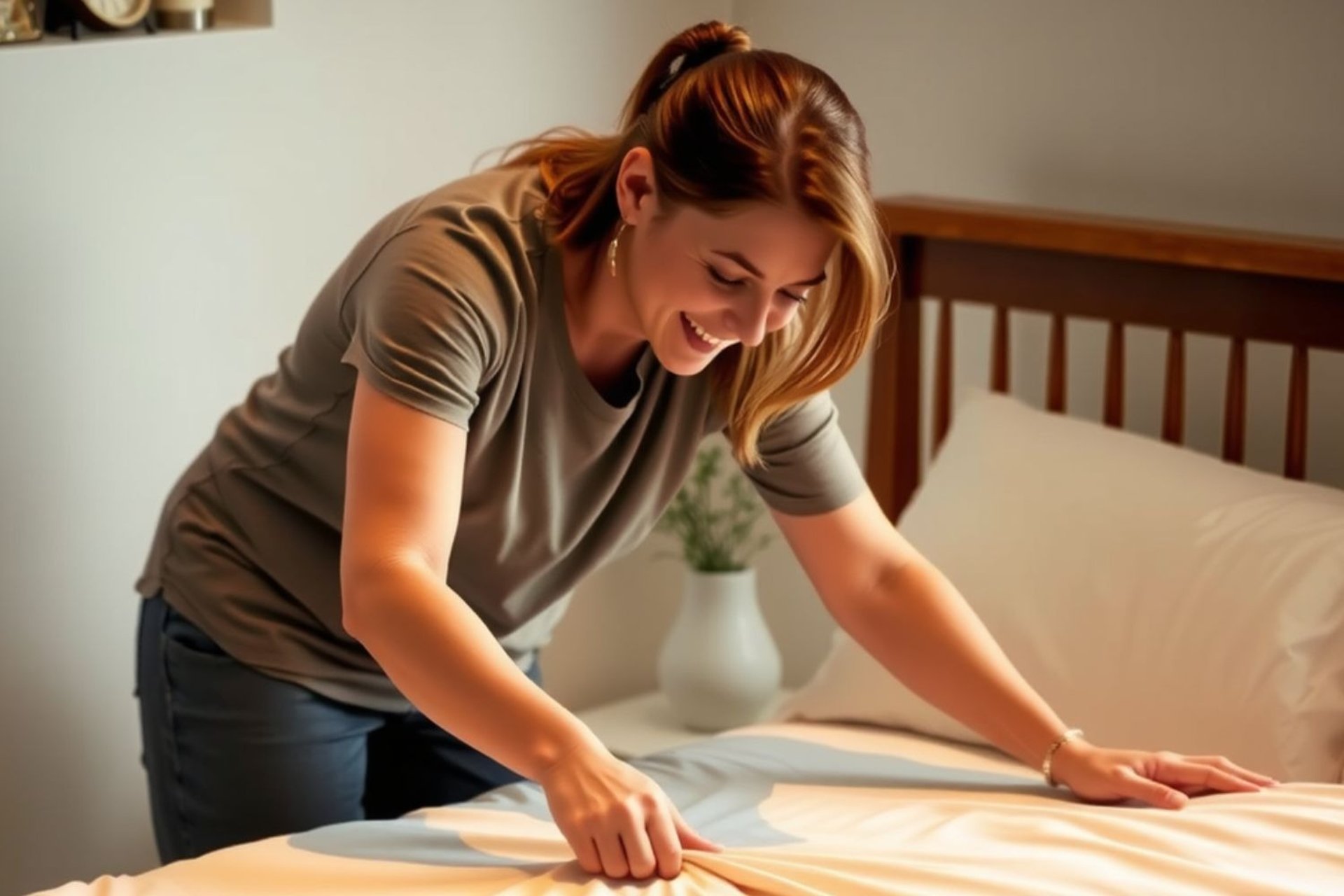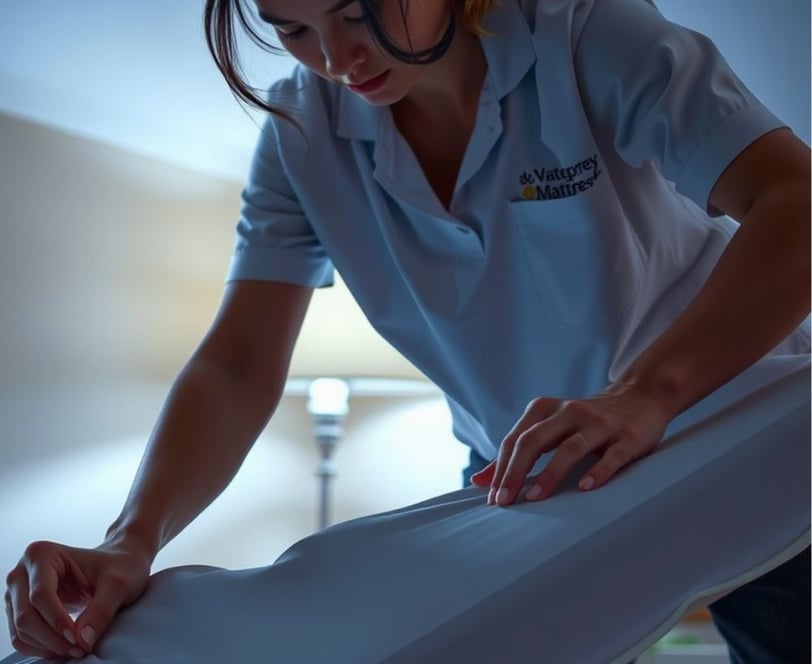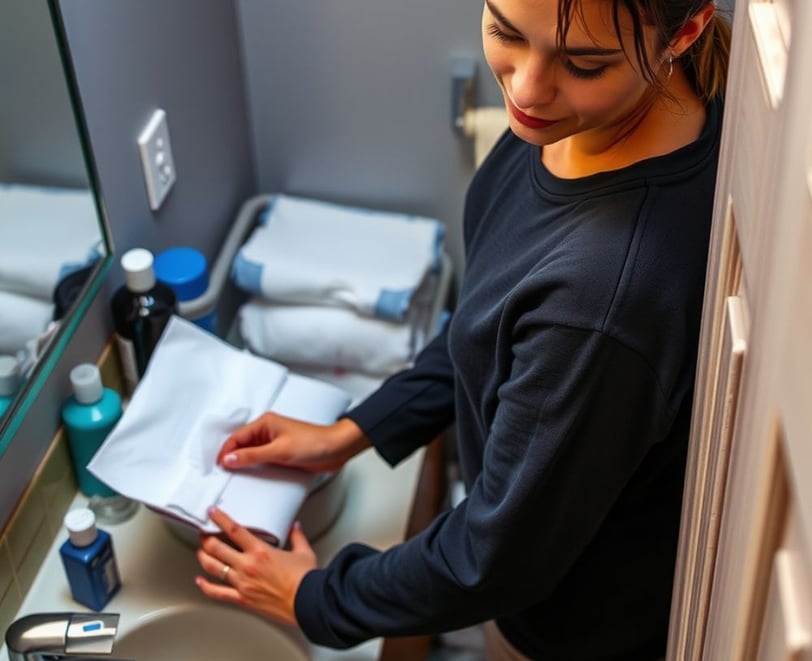
Nighttime Incontinence Solutions and Bedwetting Prevention Strategies for a Restful Night's Sleep
Let's face it, dealing with nighttime accidents can be a real drag – both for you and your loved ones. It can mess with your sleep, cause stress, and even put a strain on relationships. But don't worry! There are plenty of things you can do to make things easier and more comfortable for everyone involved.
INCONTINENCE CARE
Introduction
Think of it like this: nighttime incontinence is just another hurdle to overcome, and with the right tools and mindset, you can absolutely conquer it. This guide will walk you through everything you need to know about managing nighttime incontinence, from understanding what's going on to finding solutions that work for you.
Table of Contents


Caregiver adjusting waterproof mattress protector on bed
Managing Nighttime Incontinence for a Restful Sleep
Let's face it, dealing with nighttime incontinence can be tough – both for the person experiencing it and their caregivers. It can disrupt sleep, cause stress, and even impact relationships. But don't worry, there are plenty of things you can do to make things easier and more comfortable for everyone involved.
Understanding What's Going On
First things first, let's talk about what nighttime incontinence actually is. It simply means having an accident during the night – whether it's bedwetting (common in children), leaking urine while sleeping (overactive bladder), or just feeling like you need to pee constantly throughout the night (heavy sleep cycle).
Did you know that around 15 million adults in the US experience nighttime incontinence? It can be caused by a variety of factors, including age, medical conditions like diabetes or urinary tract infections, certain medications, and even lifestyle habits.
Spotting the Signs
So how do you know if someone is dealing with nighttime incontinence? Look out for these common signs: frequent trips to the bathroom during the night, accidents in bed, waking up feeling wet, or just general discomfort. If you notice any of these things, it's important to talk to a doctor to figure out the underlying cause and get the right treatment.
Bedwetting Solutions: A Helping Hand
When it comes to managing nighttime incontinence, several solutions can make a big difference.
Think of absorbent products like diapers or pads as your first line of defense. They're designed to absorb moisture and keep everything clean and dry. Mattress protectors are another lifesaver – they act like a shield for your mattress, protecting it from accidents and making cleanup a breeze. And don’t forget about waterproof bedding! It adds an extra layer of protection and peace of mind.
Specialized bedwetting solutions are also available, designed to be both comfortable and discreet, helping you rest easy through the night.


Absorbent pads and toiletries on a bathroom counter
Sleep Tips for Caregivers: You Matter Too!
Taking care of someone with nighttime incontinence can be demanding, so remember to prioritize your own well-being. Establish a consistent bedtime routine, create a relaxing sleep environment (think dark, quiet, and cool), and find healthy ways to manage stress – like exercise, meditation, or spending time in nature.
Protecting Your Mattress: A Long-Term Investment
A good mattress protector is like an insurance policy for your bed. It shields your mattress from moisture, stains, and bacteria, extending its lifespan and keeping it fresh and clean. Look for protectors that are waterproof, breathable, and antimicrobial – they offer the best protection against accidents and odors.
Overnight Incontinence Products: Finding What Works
There's a wide range of overnight incontinence products available to suit different needs and preferences. Absorbent pads provide discreet protection, while underwear offers more coverage and comfort. Adult diapers are designed for heavier incontinence and provide maximum security. Popular brands like Depend and Poise offer a variety of options to choose from.
Person examining a medication bottle for incontinence


Medications: A Potential Solution
In some cases, medications can be helpful in managing nighttime incontinence. Talk to your doctor about anticholinergics, beta-3 agonists, or muscarinic receptor antagonists – they work by relaxing the bladder muscles or reducing urine production. Keep in mind that medications can have side effects, so it's important to discuss the risks and benefits with your healthcare provider.
Comfort and Support: A Two-Way Street
Remember, dealing with nighttime incontinence can be emotionally challenging. Offer words of encouragement, listen without judgment, and validate their feelings. Let them know they're not alone and that you're there to support them every step of the way.
Additional Resources
For more information on Nighttime Incontinence Solutions, Bedwetting Prevention, and Strategies for a Restful Night’s Sleep, you may want to explore the following resources:
Healthline - Adult Bed Wetting (Nocturnal Enuresis): Treatment and Causes: This article explores the causes of adult bed-wetting, including hormonal issues, small bladder capacity, and overactive bladder muscles. It also discusses various treatment options such as medication, bladder training, and lifestyle changes.
WebMD - Tips for Bedwetting Prevention: This article provides tips for preventing bedwetting in children, such as reducing evening fluid intake, encouraging nighttime bathroom visits, and using reward systems. It also stresses the importance of emotional support and avoiding punishment.
National Association for Continence - Tips to Stop Bedwetting at Night for Kids and Adults: This article offers practical tips for both children and adults to prevent bedwetting, such as clearing the path to the bathroom, using night lights, and limiting fluid intake before bedtime.
National Health Service (NHS) - Fall Asleep Faster and Sleep Better: This resource from the NHS offers practical advice for falling asleep faster and improving sleep quality, including avoiding electronic devices before bed, creating a relaxing bedtime routine, and using sleep meditation techniques.
Frequently Asked Questions
Q: What exactly is nighttime incontinence?
A: Nighttime incontinence simply means having an accident during the night. This could be bedwetting (common in children), leaking urine while sleeping (overactive bladder), or just feeling like you need to pee constantly throughout the night (heavy sleep cycle).
Q: How common is nighttime incontinence?
A: You're not alone! Around 15 million adults in the US experience nighttime incontinence. It can be caused by a variety of factors, including age, medical conditions like diabetes or urinary tract infections, certain medications, and even lifestyle habits.
Q: What are some signs that someone might have nighttime incontinence?
A: Look out for frequent trips to the bathroom during the night, accidents in bed, waking up feeling wet, or just general discomfort. If you notice any of these things, it's important to talk to a doctor to figure out the underlying cause and get the right treatment.
Q: What are some good ways to protect my mattress from accidents?
A: A good mattress protector is like an insurance policy for your bed! It shields your mattress from moisture, stains, and bacteria, extending its lifespan and keeping it fresh and clean. Look for protectors that are waterproof, breathable, and antimicrobial – they offer the best protection against accidents and odors.
Q: Are there different types of incontinence products available?
A: Absolutely! There's a wide range of overnight incontinence products available to suit different needs and preferences. Absorbent pads, briefs, and even specialized bed liners can help keep you dry and comfortable throughout the night.
Wrapping Up: Effective Incontinence Solutions
Managing nighttime incontinence doesn't have to be overwhelming. With the right information and support, you can take control of your situation and get back to enjoying restful nights. Have you tried any helpful tips or products for managing nighttime incontinence? Share your experiences in the comments below! And don't forget to share this article with others who might find it useful.
Related Article
More for you



